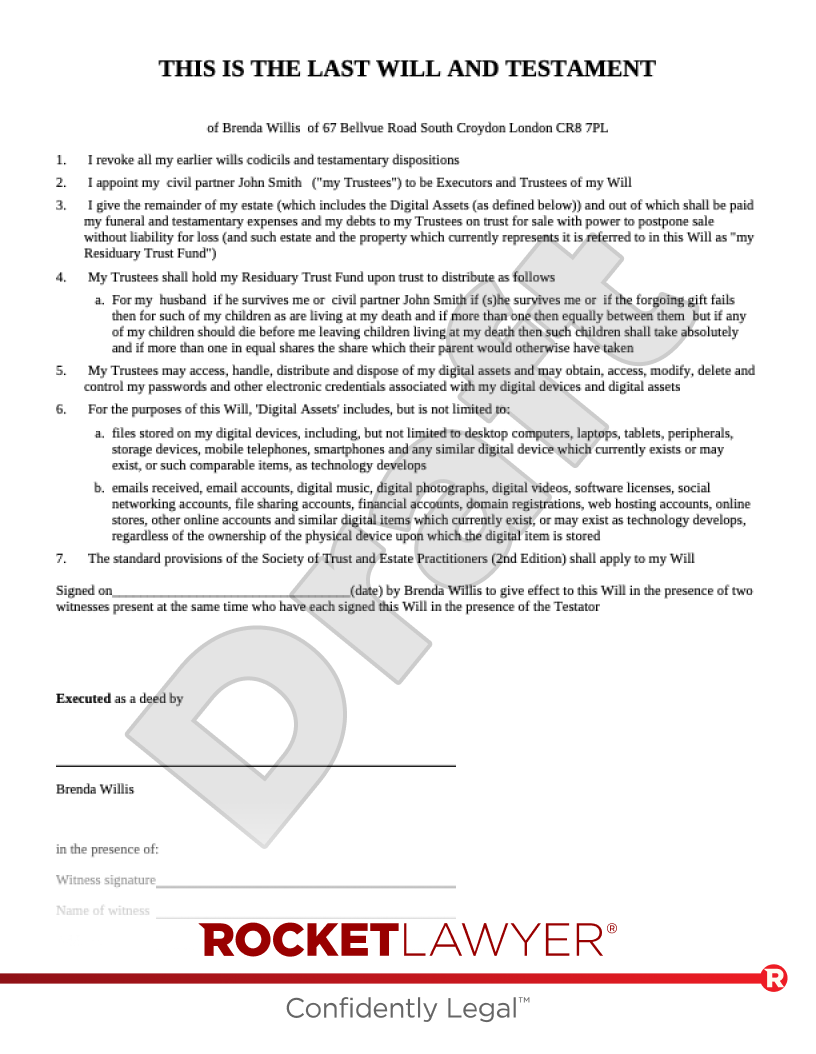What are the grounds for challenging a will?
Lack of valid execution
Under the Wills Act 1837, a will must comply with certain formalities and the correct procedure must be followed when it is being signed and formalised. If the Last will and testament has not been made properly this can lead to it being rendered invalid. For example, if witnesses were not present when the person making the will (ie the testator) signed their will, it can be challenged.
Lack of testamentary capacity
With people living longer and dementia on the rise, there is more potential for a will to be challenged on the grounds that the testator lacked 'mental capacity' when writing their will. Lacking mental capacity is defined, under the Mental Capacity Act 2005, as the inability for someone to make a decision for themselves due to an impairment of the brain. This can apply to dementia, brain injury and certain mental illnesses.
In deciding whether the testator lacked mental capacity, the courts especially consider their medical records and the opinion of a suitably qualified medical expert.
Lack of knowledge or approval, forgery and fraud
If a will has been drawn up by a third party, and the testator signs the will without full awareness or understanding of its contents, it can be deemed invalid. Examples include the deceased testator:
-
having a low level of literacy
-
being frail, unwell or otherwise vulnerable and the will being particularly complex or unusual
-
having a visual impairment
-
appearing to have directed someone else to sign the will
Similarly, if a will is forged or has been affected by fraudulent statements, this will no longer constitute an enforceable legal document.
Undue influence
If the testator was coerced to draft their will in a certain way or made changes to their will under duress, this can lead to it being rendered invalid. However, this type of claim can be difficult to prove.
Inheritance Act 1975
Even if there is no challenge to the validity of a will, it can still be contested under the Inheritance (Provision for Family and Dependants) Act 1975. This allows dependents of the deceased (including cohabitees) to make a claim against the estate if they can prove that they were financially dependent on the deceased and were not sufficiently provided for in the will.
How can I challenge a will?
The first step will usually be to enter a caveat (currently costing £3) which stops the probate process from going ahead while the dispute is ongoing. It will then be down to negotiation, alternative dispute resolution (eg mediation) or court proceedings to resolve the issues.
If you are considering contesting a will, you should Ask a Lawyer for advice as soon as possible, to discuss the specifics of your claim.
What are the time limits for challenging a will?
Any claims made under the Inheritance Act 1975 need to be made within 6 months from the date that probate was granted.
Any beneficiaries under a will who wish to contest part or the whole of the will, have up to 12 years from the date of death.
If the nature of the claim relates to fraud, there is no time limit.
How can I defend a will that is being challenged?
If you have been notified of a caveat that has been lodged, the first thing you can do to challenge this is to issue a 'warning'. There is no fee for the warning. A caveat only remains in place for 6 months, unless it is renewed.
The personal representative (ie the person that administers the estate) can, however, also take steps to try and have it removed. To challenge a caveat, the personal representative must lodge a 'warning' at the Probate Registry.
Obtaining copies of a will
If you're not the executor (or executrix) of the will (ie someone who carries out the administrative duties and tasks in making sure the testator's wishes are followed according to the will), then you will need to order a copy from the probate court (if the deceased's will was filed with the courts). Once a grant of probate (or letters of administration) has been issued, a will becomes a public document and anybody can apply to have a copy of the will.
Once the testator passes away, the probate court will open the will, provides it was filed with the probate court of the county the deceased resided in. The will then becomes a public record. The best way to view the will is to get the probate court file number. The executor can give you this information.
Getting a copy of a will is possible by paying a copying fee. Some courts will also provide you with a copy by fax or mail of a will on file. A certified copy of a will is a document that has been stamped and certified by the court to be an exact copy of the official document. You can search for a copy by using the Government's Find a will or probate document webtool online.
If you have any questions about contesting a will, Ask a Lawyer.




